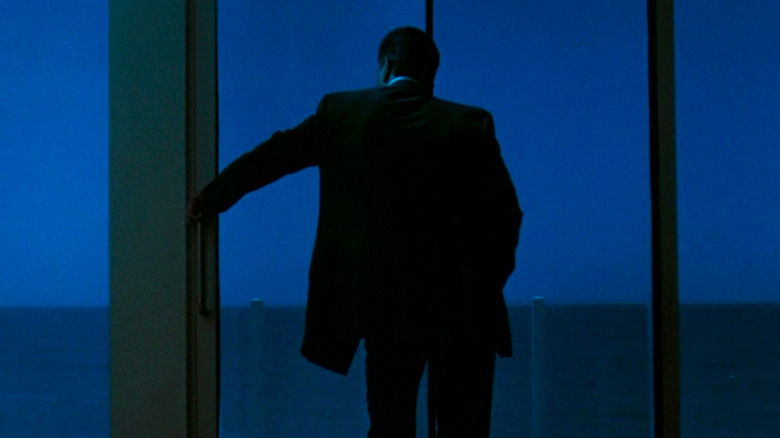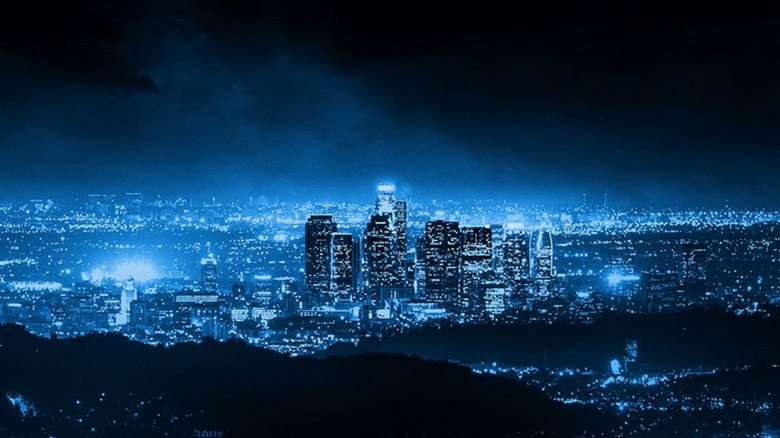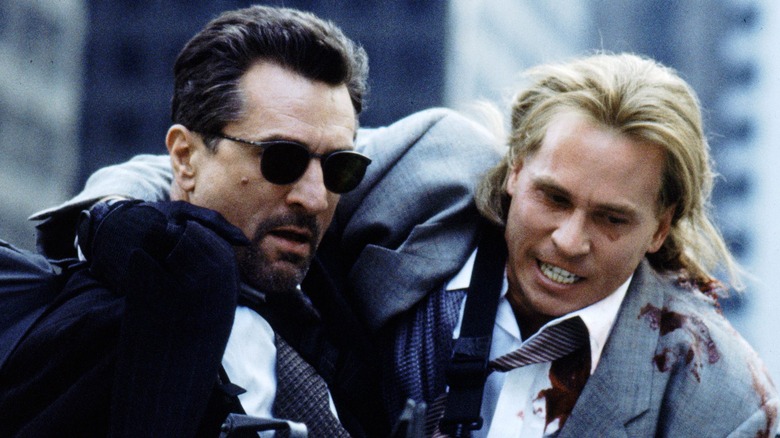Heat 2 Review: An Action-Packed Page-Turner That Feels Just Like A Michael Mann Movie
Michael Mann's "Heat" is a modern classic — a sprawling, violent, engrossing crime epic that fans have obsessed over for years (example: Blake Howard has an incredible podcast called One Heat Minute that breaks down the entire film minute by minute). It's arguably Mann's most popular movie — the one we return to, again and again, despite (or perhaps because of) its overwhelming runtime. The overstuffed nature of the film hooks us, and makes us feel as if we're part of the world Mann is creating.
Mann's 1995 film, inspired by true events and a reworking of his TV movie "L.A. Takedown," follows two men obsessed with what they do. There's live-wired cop Lieutenant Vincent Hanna (Al Pacino) and career criminal Neil McCauley (Robert De Niro). They're on opposite sides of the law, and couldn't be more different in temperament — Hanna has an off-screen cocaine addiction that turns him into a loud, over-the-top force of nature, while McCauley is quiet, calm, and reserved — and also a sociopath who wouldn't hesitate to gun down an innocent bystander if it benefited him in any way. Despite their differences, the men formed a connection — they were like kindred spirits.
While the main focus (and marketing) of "Heat" was devoted to Pacino and De Niro's characters, Mann's film also had a large cast of cops and robbers, including Val Kilmer playing Neil's right-hand man, Chris Shiherlis. In the end, every member of Neil's crew except Chris was killed following a show-stopping bank robbery. Neil, too, was eventually killed — by Vincent, in the film's haunting, beautiful final moments.
With so many main characters dead, and the story seemingly wrapped up, one has to ask: how do you make a sequel to "Heat"? If you're Michael Mann, you team up with Meg Gardiner and craft a story as sprawling and violent as the film that inspired it. "Heat 2," which hits bookshelves today, is a lean, mean, time-and-globe trotting story that brings back familiar characters and introduces some new ones, too. And Mann and Gardiner manage to translate the quirks and habits of the actors who played these men into the book — the book version of Hanna is just as volatile and shouty as Pacino's performance, while McCauley remains the quiet, calculating man De Niro played so well. But how can McCauley be back if he was killed? The answer is all about time.
A certain melancholy
"Heat 2" picks up in the immediate aftermath of the film, with Hanna and his men running down the remaining leads involving with McCauley and his crew. The killing of McCauley is clearly weighing heavily on Hanna, who still can't help but relate to the man he shot to death. As Mann and Gardiner flashback to the now-famous diner conversation between Neil and Vincent, they write:
"While revealing nothing that might compromise themselves, they talked with the intimacy sometimes occuring between strangers. They discovered that they took in the real world and the way life rushed at them in similar ways."
Later, when Vincent is standing in Neil's now-empty home, the authors note:
"A certain melancholy holds him to the hardwood floor. A life gone, irreversible, a man he knew."
While everyone else in Neil's crew is dead, Chris is still alive — and the dogged Hanna wants to catch him. That won't be easy, though, because Chris is on the run. Leaving his wife Charlene and son Dominick behind, Chris gets out of the country and eventually ends up in South America. From here, Mann and Gardiner begin jumping around in time. We head back to the 1980s, where a younger Vincent and his crew are preparing a job in Chicago. As it so happens, Hanna is working as a cop in Chicago at the time, although he and Neil never cross paths.
Instead, Hanna is investigating a series of brutal, sadistic home invasions, perpetrated by a gang led by a truly repulsive character named Wardell, who recalls racist scumbag serial killer Waingro from the original movie. As fate would have it, Wardell becomes aware of a new score that Neil and his gang are fixing to pull off — and reasons he can get the drop on them and make off with their loot.
An action-packed page-turner
Flashbacks can only take up a certain amount of page time here, which means that Chris more or less becomes the main character as the book unfolds. In fact, Hanna vanishes for a huge chunk of the narrative as Chris gets in good with a crime family in South America and falls for a new woman in the process. While there's nothing wrong with this idea, and Kilmer's performance was memorable in the film, Chris just can't compete as a character when compared to Neil and Vincent. We're interested in his inner workings — his gambling addictions, his loneliness, his thirst for revenge against Neil's killer — but we're never quite as engrossed as we should be. As Chris' story unfolded, I couldn't help but wish the story would switch back in time to focus on Neil or Vincent.
This doesn't sink "Heat 2," though, as the book's sprawling nature and the way Mann and Gardiner slowly but surely start tying all the narrative threads together makes for thrilling reading. Indeed, "Heat 2" moves at a near breakneck pace, sweeping us along like an addictive film. The result is a pulpy, action-packed page-turner that fully engulfs us in the moody, bloody, romantic worlds Mann creates in his films. In the end, "Heat 2" may not be as good as "Heat," but hell, what is?
"Heat 2" is now available from William Morrow through the HarperCollins-based Michael Mann Books.


